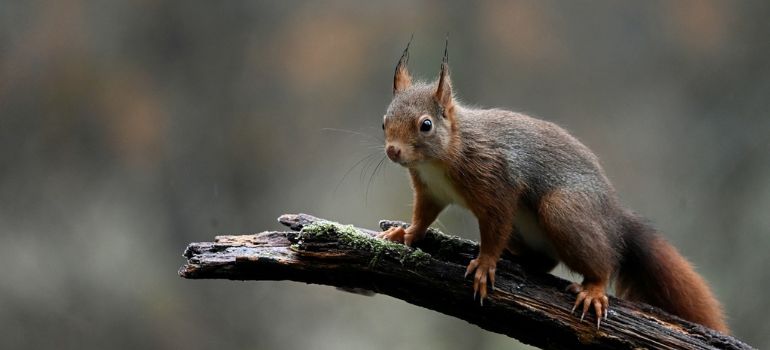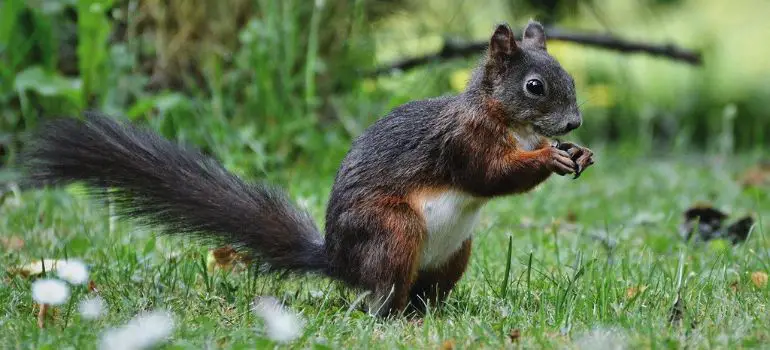Understanding Squirrel Behavior
Before we delve into methods to prevent squirrels from feasting on your pine cones, it’s essential to understand their behavior. Squirrels are known for their insatiable appetite and keen sense of smell. They often forage for food in gardens and trees, which makes your pine cones a tempting treat.
Natural Deterrents
Planting Squirrel-Repellent Plants
Certain plants have natural repellent properties that can deter squirrels. Examples include daffodils, hyacinths, and alliums. These plants emit scents that squirrels find unpleasant, making them less likely to approach.
Using Predator Urine
Predator urine, such as that from foxes or coyotes, can be purchased and applied around your garden. The scent of these predators can scare squirrels away, as they perceive them as threats.
Installing Motion-Activated Sprinklers
Motion-activated sprinklers can startle squirrels when they approach your pine cones. The sudden burst of water can discourage them from returning.
Physical Barriers
Squirrel-Proofing Your Trees
- Tree Collars: One of the most straightforward methods is to wrap tree trunks with smooth metal or plastic collars. Squirrels find it challenging to grip onto these slippery surfaces, making it difficult for them to climb. Ensure the collars are placed low enough on the tree trunk to prevent squirrels from jumping over them.
- Pruning Overhanging Branches: Squirrels are excellent jumpers, and overhanging branches provide them with easy access to your trees. Trim back branches that are close to your pine trees to create a gap that squirrels cannot easily traverse.
- Grease the Trunk: Applying a layer of grease or petroleum jelly to the tree trunk can make it nearly impossible for squirrels to climb. Make sure to reapply the grease if it wears off due to weather conditions.
- Squirrel Baffles: Install squirrel baffles on the tree trunks. These are cone-shaped devices that prevent squirrels from getting a foothold on the tree. When they attempt to climb, they slide down the baffle, thwarting their efforts.
- Aluminum Foil or Flash Tape: Wrapping aluminum foil or hanging strips of flash tape around your tree can create a visual and auditory deterrent. The reflective surface and noise when the wind blows can startle squirrels and keep them away.
- Electronic Repellent Devices: Consider using electronic repellent devices that emit ultrasonic sounds or flashes of light that irritate squirrels. These devices are harmless to humans and most pets but can be effective in keeping squirrels at bay.
- Tree Guards: Install tree guards around the base of your trees. These can be made of wire mesh or plastic and create a barrier that squirrels cannot penetrate.
- Trim Nearby Trees: If there are other trees close to your pine tree, squirrels might use them as launching points. Trim or remove nearby trees if possible to limit their access routes.
Pine Cone Netting
Pine cone netting is a practical and effective method to safeguard your precious pine cones from the relentless appetite of squirrels and other wildlife. This simple yet ingenious solution creates a barrier around your pine trees, preventing access to the enticing pine cones. Here’s how to use pine cone netting effectively:
- Choose the Right Netting: When selecting netting, opt for a fine mesh material that is strong and durable. The mesh size should be small enough to keep squirrels from reaching through but large enough to allow the pine cones to grow naturally.
- Measure and Cut: Measure the circumference of the tree where you want to protect the pine cones. Ensure that you have enough netting to encircle the tree without leaving any gaps. Cut the netting to the required length.
- Wrap Around the Tree: Begin by gently wrapping the netting around the tree trunk, starting from the base and moving upwards. Ensure that it is snug but not too tight to avoid damaging the tree’s bark.
- Secure the Netting: Use zip ties, twist ties, or string to secure the netting in place. Make sure it is firmly anchored to prevent squirrels from lifting or removing it.
- Cover the Pine Cones: As your pine cones begin to form, ensure that they are enclosed within the netting. The netting acts as a protective barrier, making it difficult for squirrels to access the cones.
- Regular Maintenance: Periodically check the netting to ensure it remains intact and that no gaps have developed. Repair or replace any damaged sections promptly.
- Remove During Harvest: When it’s time to harvest your pine cones, carefully remove the netting to access them. Be gentle to avoid damaging the pine cones or the tree.
- Store Netting: Store the netting properly when not in use to prevent it from deteriorating. Proper storage ensures it will be ready for the next pine cone season.
Homemade Squirrel Repellents

Spicy Pepper Spray
Create a spicy pepper spray by mixing water and cayenne pepper. Spray it on your pine cones to make them less appealing to squirrels, who dislike the spicy scent.
Garlic and Vinegar Solution
Mix crushed garlic cloves and vinegar to create a pungent solution. Spray it on your pine cones to deter squirrels with its strong odor.
Ammonia-Soaked Rags
Placing ammonia-soaked rags near your pine cones can discourage squirrels. The strong ammonia smell is a powerful repellent.
Feed Them Elsewhere
Set up a designated feeding area away from your pine cones. Offering squirrels an alternative food source can divert their attention from your prized cones.
Squirrel-Proof Bird Feeders
Squirrels are notorious for raiding bird feeders, often leaving your feathered friends with nothing to eat. If you’re an avid bird watcher and want to ensure that your bird feeders remain a haven for birds and not squirrels, consider investing in squirrel-proof bird feeders. These cleverly designed feeders are specifically crafted to keep those persistent squirrels at bay while still providing nourishment for your avian visitors. Here’s how squirrel-proof bird feeders work and some tips for choosing the right one:
- Weight-Activated Mechanism: Many squirrel-proof bird feeders employ a weight-activated mechanism. They are designed to support the weight of birds while closing access to the food when a heavier squirrel tries to land. This ingenious system ensures that only birds can access the feed.
- Baffle Systems: Some bird feeders come equipped with baffles or shields that create an obstacle for squirrels attempting to climb down from above. The baffles prevent squirrels from reaching the food below.
- Adjustable Sensitivity: Look for feeders that allow you to adjust the sensitivity of the mechanism. This feature lets you fine-tune the feeder to the weight of the birds you want to attract, ensuring that smaller birds can feed without triggering the closure.
- Durable Construction: Opt for bird feeders made from sturdy materials like metal or heavy-duty plastic. Squirrels are persistent and can be quite resourceful, so a well-built feeder is essential for long-term effectiveness.
- Easy to Clean: Choose a feeder that is easy to disassemble and clean. Regular cleaning helps maintain the health of the birds that visit your feeder.
- Placement Matters: Proper placement of your squirrel-proof bird feeder is crucial. Hang it at a distance from trees or structures that squirrels could use as launching points. A clear, open area is ideal.
- Seed Selection: Consider the type of birdseed you use. Squirrels are less attracted to safflower seeds and nyjer seeds, so using these options can help deter them.
- Regular Monitoring: Keep an eye on your feeder to ensure it continues to function correctly. Squirrels can be tenacious, and they may attempt various methods to defeat the deterrent.
Maintain a Tidy Yard
Maintaining a tidy yard not only enhances the aesthetics of your outdoor space but also plays a significant role in deterring squirrels from feasting on your pine cones. A well-kept yard not only reduces the appeal of your garden to squirrels but also makes it more challenging for them to find hiding spots and access to food sources. Here are some essential tips on how to maintain a tidy yard and discourage squirrel activity:
- Regular Cleanup: Make it a habit to regularly clean up fallen pine cones, nuts, and other debris from the ground. These items serve as a ready food source for squirrels. Removing them reduces the incentive for squirrels to visit your yard.
- Prune Overhanging Branches: Trim back overhanging branches from nearby trees and bushes. This not only reduces the access points for squirrels but also minimizes the shade and cover they seek.
- Secure Garbage Bins: Ensure that your garbage bins are tightly sealed and secure. Squirrels are skilled scavengers and can easily access food scraps if the bins are not properly closed.
- Store Birdseed Securely: If you have bird feeders in your yard, store birdseed in tightly sealed containers. Squirrels are attracted to spilled seeds on the ground, so keeping the area beneath the feeders clean is essential.
- Use Trash Receptacles with Lids: If you have outdoor trash receptacles, use those with secure lids. This prevents squirrels from rummaging through your trash and making a mess.
- Keep Firewood Neatly Stacked: If you store firewood outdoors, stack it neatly and away from your house. Squirrels often nest in woodpiles, so keeping them organized and tidy reduces the appeal.
- Clean Gutters and Downspouts: Ensure that your gutters and downspouts are free from debris and blockages. Squirrels may use them as pathways to access your roof and subsequently your pine cones.
- Remove Excess Vegetation: Overgrown vegetation can provide squirrels with hiding spots and easy access to your trees. Regularly trim and maintain your plants and bushes.
- Use Squirrel-Proof Bird Feeders: If you have bird feeders, invest in squirrel-proof designs. These feeders are designed to prevent squirrels from accessing the birdseed.
- Install Motion-Activated Lights: Motion-activated lights can startle squirrels when they enter your yard, making them less comfortable in your space.
Seek Professional Help
If squirrels continue to be a persistent problem, consider contacting a professional pest control service. They can offer expert solutions to keep squirrels away from your pine cones.
Conclusion
Stopping squirrels from eating pine cones requires a combination of natural deterrents, physical barriers, and homemade repellents. By understanding squirrel behavior and implementing these strategies, you can enjoy your garden and pine cones without the constant battle with these furry foragers.
Frequently Asked Questions (FAQs)
Yes, squirrels dislike the scent of daffodils, hyacinths, and alliums, which can deter them from your garden.
No, motion-activated sprinklers are safe and only provide a harmless burst of water to scare squirrels away.
No, ammonia can be harmful to pets, so use this method with caution and keep it away from them.
Reapply the spicy pepper spray after rain or every few weeks to maintain its effectiveness.
If the problem persists, consider seeking professional pest control services for a more comprehensive solution.



